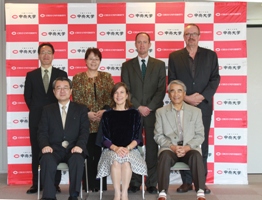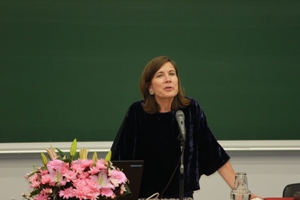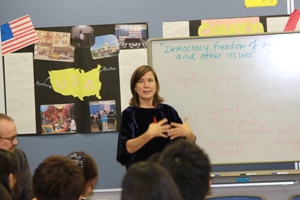2012.10.26
News
ILO Expert Visits Chuo

Karen Curtis, Deputy Director of the International Labour Standards Department at the International Labour Organisation (ILO), Geneva, came to Chuo University Tama Campus on October 26 to meet with Chuo University President Fukuhara and different academic staff, as well as to give a public lecture for students and faculty members on International Labour Standards and have informal discussions with Faculty of Law students interested in international labour issues.
The ILO was founded in 1919, and, soon after end of the Second World War, it became the first specialized United Nations Agency in 1946. Since its foundation, the ILO’s mission has been to work for global peace by promoting social justice and decent work through establishing and overseeing internationally recognized labour rights and standards.
Having worked for the International Labour Standards Department of the ILO for more than 20 years, Deputy Director Curtis has a huge depth of experience, particularly on matters to do with freedom of association and collective bargaining. Her work is deeply concerned with ensuring that fundamental labour rights such as freedom of association and collective bargaining are known, recognized, respected and exercised in action, not just in words, by the ILO’s 185 member states.
Delivering her public lecture, Recent successes and challenges for international labour standards, to several hundred students, Deputy Director Curtis looked at five main areas of the ILO’s work for international labour rights and standards:

o the ILO’s work over two decades in trying to end forced labour and promote freedom of association in Burma/Myanmar;
o the groundbreaking integration of fundamental rights and principles, from nearly 70 existing maritime labour instruments, into a single new Convention - the 2006 Maritime Convention - to protect seafarers’ rights;
o the ILO’s work in helping the Philippine military forces to respect and protect freedom of association (particularly for trade unionists) through providing human rights training and guidelines for military personnel;
o innovative work done by the ILO on promoting far-reaching international labour standards for Domestic Workers through the ILO’s Convention 189 and Recommendation 201, both of which were recently adopted in June 2011;
o the ILO’s International Programme on the Elimination of Child Labour (IPEC).
The lecture ended with a lively question and answer session between students and Ms. Curtis.
Earlier in the day, Deputy Director Curtis had led a 60-minute informal discussion with 30 undergraduate and graduate students on the issue of Freedom of Association. This was a highly stimulating session conducted in English in the Faculty of Law Resource Center, and those present greatly benefited from the rare opportunity to talk directly with one of the ILO’s leading

After the public lecture, Deputy Director Curtis returned to the Resource Center to meet with 20 students who have been to the ILO in the last several years to research international labour issues. These students have gone to the ILO through an International Work Experience Programme that the ILO generously provides in Geneva for two weeks each summer – a unique programme within the UN system for Chuo undergraduates taking the Faculty of Law’s International Internship and Diplomacy Issues course.
The visit by Deputy Director Curtis on October 26 offered students and faculty members precious opportunities to hear about both the difficulties and achievements the ILO faces in drawing up and overseeing international labour standards. It was also a very welcome opportunity to reconfirm the already very strong relationship between the ILO and Chuo University and to consider further contacts between the two institutions for the future.
